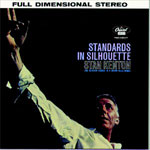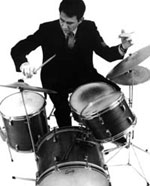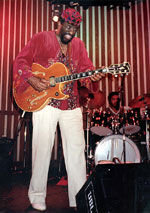You're Too Hip, Baby
| |

| I'll admit I'm a sucker for Stan Kenton at his best- I remember the trip to Berwick Street where I came away with a copy of 'Standards in Silhouette', recorded in Full Dimensional Stereo. Having browsed through the racks of post-rock, expensive imports and hard-to-find punk and new country in Select-a-Disc, the combination of Ut's 'Griller' and the aforesaid Kenton effort seemed to make perfect sense. As it still does, and I'm inclined to think there's room in every collection for the kinds of extreme dynamic range you find in Kenton's big band experiments. Steve Albini, I'm sure, learnt a thing or two studying the timing and shifting moods this man could work into a collection of timeworn standards. The blaring brass section cuts through the shifting reeds on 'Willow Weep for Me', a piercing ambulance siren through fog. Elsewhere he treats us to a stellar reworking of the John Lewis favourite 'Django'. I love that title, and seeing it listed on the reverse cover, with the guarantee of 24-bit remastering, I pictured the spaghetti western hero, all guns blazing, dragging his coffins through a mud-soaked town. Don't mess with Stan's clan. No one can deny his eye for talent: from the 1940's army days through to the later kudos of conducting a full-scale symphony orchestra, he was a white man's Duke Ellington for the TV age, promoting new talent with the gruff charm of a Brian Clough. Art Pepper, Charlie Mariano, June Christy, Shelly Manne, awesome talent who passed through his Barmy Army at various stages. If any one thing appeals in his team's set-up, it's the free-for-all approach he fostered. No standard was safe in his hands- you can picture Kenton late at night, chomping on a cigar, working out the scores of each number, going for direct appeal, how to hit the bull's eye in three minutes. Music for head, heart and work. Mind you don't miss out next time you're in Soho. |

| Kenton justifies everything that's good and life affirming about big band playing. It reminds me of why I have so little time for Louis Armstrong. Satchel mouth says nothing to me, but his dedicated imitator and, if the annals of jazz are to be believed, critical whipping boy Teddy Buckner hits me in the gut every time. Buckner could be dismissed as a journeyman, but there's such fire in his playing I'd urge any record company to revive his back catalogue immediately. Footage of his band giving their all during the unforgettable opening sequences of Hush Hush Sweet Charlotte, Robert Aldrich's no-holds-barred Grand Guignol, is commendation enough. The bulldozing Aldrich style thrived on creating impressive contrasts. You see poor Bruce Dern's head fall victim to axe-wielding Bette Davis (or so it seems) and are given a jackboot in the face by the Buckner combo turning on the heat in another room. If he'd been working in the 80's he could have made some great pop videos for catchy cap-gun songs of the day- Duran Duran 'Girls on Film', or anything by Frankie, would have given him useful pocket money. It's easier for me to spin Buckner's Armstrong tribute album than to contemplate the horrors perpetrated on countless Armstrong All stars records on CBS at the time. That's without mentioning ol' gravel-voice slurping gravy through 'Wonderful World' (covered by the BMX Bandits I recall, surely enough said, and reason enough why post-50's Satchmo should be sold off with immediate effect.) No, Teddy Buckner hits the high notes, supported on the bandstand by a hardened team of recruits- doing what Louis used to do best in his Dixieland days. No one's top lip has gone soft here. The whole thing has the charming feel of sozzled marching bands braving all elements on a September evening in a small Italian town, playing for the love of it and doing it much better than the official state sanctioned bands, on inflated lifetime stipends. Going through the standards, pulling the heart strings, inviting you to let your heart sing with them. Figaro and his pied pipers, full of life and not giving a damn. It's an odd week by any standards when Stan Kenton crops up repeatedly, but the man's been following me like a wraith. All the way to what I thought was a junkyard over the bridge in Romsey Town, piled high with cheapo cheapo records and books, the odd period piece instrument and wind-up gramophone. I told the owner I liked the look of his framed Shelly Manne poster from the 1950's. The high octane skinsman pictured at his kit of the time- "Shelly Manne plays Leedy drums" (there, such trivia puts a skip and a jump into your step), and he showed me his well-thumbed biography of the great drummer. Rummaging around put me in mind of great 50's jazz moments: so, by the time I had walked away and politely refused the £25 asking price for the picture, my head was buzzing with images to get my jazz adrenaline back in circulation. Miles Davis whirring through 'Budo' on a dusty 78rpm piece of shellac, June Christy giving an all-or-nothing, gin-soaked 'Something Cool' to chill the most sentimental listening ears, Shelly Manne's hands of elastic bolstering the soundtrack of Cassavetes' Too Late Blues and motoring through impossible time signatures on Ornette Coleman's 'Tomorrow is the Question!!!' |

| The other thing that springs to mind is, how valuable is any given record in a collection? The bigger my collection swells to, the more I'd be prepared to part with a boxful of items readily at any given time. Distillation is a great feeling, carrying out a much-needed cull. I love to justify the inclusion of every 7" or cassette, so people should fight for their place in the squad. Lee Hazelwood/ Nancy Sinatra, Echo, Scritti and Joni Mitchell's 'Court and Spark' were among the items to jump ship recently. I got much more than I'd paid for them, and I'd found a copy of James Blood Ulmer's 'Tales of Captain Black' at Hitchin market, with the Rough Trade 7" of 'Are You Glad to be in America?' tucked safely inside, so it made perfect sense. James Blood or James White, versus Joni or Leonard Cohen? I'd trade a hatful of well-worn mediocrities for one moment of free jazz perfection, Roswell Rudd and Archie Shepp facing off live onstage at San Francisco. One well-aimed blow by young welterweight Arturo Gatti packs more mileage than most half-hearted contenders: rewind and replay to old blubber-paws Audley Harrison. Fante (senior) knows what I mean. A burst of Geoff Travis-produced James Blood (Travis had a tinker with the mayhem here too), with the safe-hands back-up of Amin Ali, David Murray, Oliver Lake and co. speaks for more than anything you'd find in your local Virgin megastore sale, guaranteed. Musical utopias- to me it's all in a bellyful of reverential dub and full-throated jazz blowing, gold teeth and gold-plated brass. Pure excitement, guitar-strings stretched to their ultimate pitch. Ulmer pictured in uncompromising form on the cover, eyelids drooping meanly like an out-of-work Philip Marlowe. This cat turns Ornette's handiwork into rocket fuel. Sonny and Lynda Sharrock once competed on the same exalted level, with twitching switchblade guitars and vocals that sounded like freshly swallowed razor blades. On the inside of the gatefold, sci-fi style fantasy graphics picture superfly sharp operators leaping into action above New York's mean streets. The revolution was televised back in the late 70's, but we were too switched-off to notice. "Lonely Woman" on my Kenton album sits happily alongside the torrential swell of "Woman Coming" on my James Blood. Different tunes, different execution, different age, but scratch the surface and their claws will draw blood. © 2002 Marino Guida |